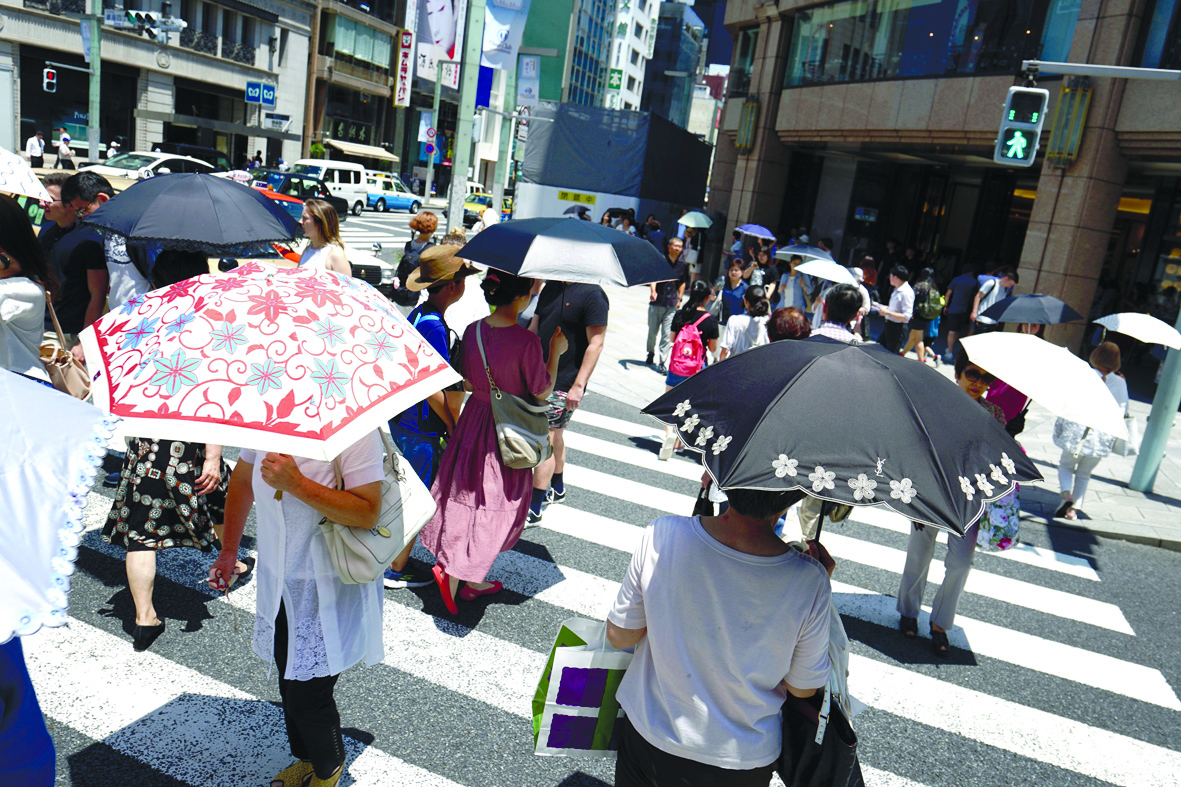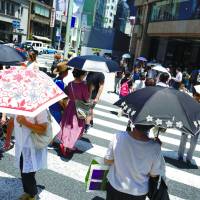This year's heat wave is again lethal, having already killed over 30 people and sent more than 10,000 to hospitals since July 9 due to heat exhaustion and heatstroke.
The extreme weather continued to scorch Japan this week, with many cities seeing their highest-ever recorded temperatures. The mercury rose to as high as 40.7 degrees in the city of Tajimi in Gifu Prefecture on Wednesday.
Unfortunately we will have to continue to deal with this sweltering summer for at least the next week or two, and weather forecasts say the high heat will not go away anytime soon.
Here is a survival guide for the hot summers in Japan and other heat-related information.
What can I do to prevent heat-related illnesses?
The number one countermeasure is to avoid sudden exposure to extremely high temperatures.
According to the Environment Ministry, heat-related illnesses are caused by the failure of bodily functions meant to have a cooling effect because of reduced sweating and blood flow. The early signs of heat-related illness include dizziness, a flushed face, aching and cramping muscles, and nausea. The disease can lead to even more serious symptoms such as disorientation and coma.
The ministry recommends wearing light, cool clothes and staying in the shade when going outside. It also urges people to keep hydrated by drinking plenty of water and consuming sodium.
In case of dehydration, oral rehydration therapy or treatments consisting of a solution based on salt and sugar taken orally can be useful as an emergency cure. If such a solution cannot be found at a convenience store, it can be made at home from a liter of clean water, six teaspoons of sugar and a half teaspoon of salt, according to the Japan Committee for UNICEF.
Drinking cold barley tea, a popular summer flavor in Japan, is also believed to be effective for rehydration because it helps to top up minerals lost in sweat, according to the weather forecasting website tenki.jp, which is run by the Japan Weather Association.
How can I learn about the risks of heat-related illnesses?
The Environment Ministry's website for heat-related illness prevention (www.wbgt.env.go.jp/en/) shows an hourly updated heat stress index by region.
The heat stress level is measured by the Wet Bulb Globe Temperature index, which indicates the risk of heat-related maladies based on factors such as temperature, humidity, wind and infrared radiation. A WBGT above 28 degrees significantly increases the risk of exhaustion or heatstroke.
The WBGT index in Tokyo at 2 p.m. Friday was 32.5 degrees, a level at which any kind of exercise should be prohibited.
When will this extreme heat go away?
Weather forecasts say the scorching heat will continue for at least the remainder of this month.
The Japan Meteorological Agency forecasts that temperatures everywhere in Japan except for Okinawa Prefecture and the Amami islands in Kagoshima Prefecture will continue to be higher than usual until the beginning of August. The agency forecasts that the heat will ease to the level of a usual summer, or a little higher, from Aug. 4 to 17.
But Weathernews Inc. predicts the extreme weather will return in late August to early September, due to the arrival of two anticyclones — the Pacific and the Tibetan — over Japan's main island.
What else should I know about this year's hot summer?
According to Weathernews, the seven-day moving average lowest temperature in Tokyo in August has risen by 2.7 degrees since a century ago, while the moving average highest temperature during the month has also increased by 1.5 degrees.
The Chiba-based weather information company says the rising temperature can be attributed to the heat island effect, in which the temperature in urban areas covered with concrete increases due to a lack of cooling provided by trees and plants, as well as heat released by human activities and machines.
Meanwhile, increased usage of air conditioners on Wednesday forced Kansai Electric Power Co. to buy 1 million kilowatts of electricity from other domestic power companies to meet the high demand seen in the region from 4 p.m. to 5 p.m.
The unusual heat has also hit popular summer high school baseball tournaments across the nation. On Thursday, 34 teenagers in Kumamoto Prefecture, mostly high school students who were cheering for their schools at a baseball stadium, were sent to hospital after complaining of symptoms of heat exhaustion.
Information from Kyodo added




















With your current subscription plan you can comment on stories. However, before writing your first comment, please create a display name in the Profile section of your subscriber account page.